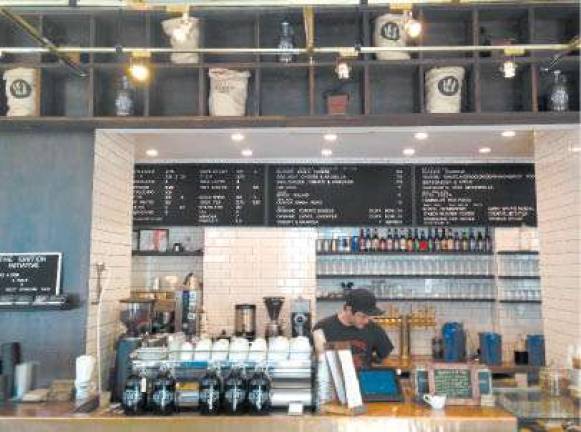Slow-Roasted Success for Local Coffee Chain

The founders of Birch Coffee let their business plan percolate and are ready to expand
Jeremy Lyman, co-founder of Birch Coffee, readily compares his company to that of a famous ? if fictional ? drug kingpin.
Birch Coffee is about to celebrate the opening of its fourth location on the Upper East Side on Sept. 10, and Lyman thinks that, like the two characters in Breaking Bad who started an unlikely brewing business together, this is just the beginning.
So how far along is Birch compared to Walter White's crystal meth gig?
"We're at the moment before Walt says that he's in the empire business," said Lyman, meaning that, though Birch is growing, it is not yet one of the independent coffee cartels, like Stumptown or Blue Bottle. But within the year he and his cofounder, Paul Schlader, hope to make some inroads: they have plans to open their own roasting house and another new store in the Financial District.
"Before we get to a point where we're just growing out of control, it's super important that the stores are functioning well," Lyman said. "We'd rather work out all the kinks when we have four or five stores than have those same kinks when we have 20 stores."
Five years ago, Birch looked like anything but a nascent coffee empire.
Lyman was working a corporate desk job that he hated, and Schlader had been working in restaurants for fifteen years; neither of them knew anything about coffee. But Lyman loved coffee shops and Schlader had always wanted to own a business, so they moved forward with their pet project at a time when Starbucks was closing hundreds of stores and the future of coffee shops was far from certain.
They were working 100 hours a week at their Flatiron shop but made only $100 on their first day, and started piling up credit card debt. Employees were quitting faster than they could hire them and Schlader was drinking so much coffee that he eventually had to give it up entirely for over a year.
And then a Stumptown coffee shop opened a block and a half away.
"We immediately thought, forget it," Lyman said. "We shouldn't even have opened."
Instead of crushing Birch, however, the competition fueled Lyman to strategize a better business plan. He hired his masseuse, who had just opened a business-consulting firm, to help guide the company. Lyman learned to delegate and not micromanage. He and Schlader doubled-down on what they'd learned from working in restaurants-incredible service-even if Lyman admits their coffee wasn't as good as they were telling people.
A loyal customer texted Lyman in the middle of the night when her plane landed, and said she would be "eternally grateful" if some of the iced coffee they delivered in growlers was waiting for her when she got home.
"I didn't have anything better to do," said Lyman, who lived 10 minutes from her apartment. "So I just dropped it off."
That got their growler delivery service started. And just when money looked like it was about to run out, a big catering gig came through. Toward the end of their first year, a neighborhood blog selected Birch over Stumptown for best neighborhood coffee.
"It was so silly, but for us it was really important that first year," Lyman said. "It kind of showed us, just because there is a big player a couple of blocks away, you're not insignificant."
Their iced coffee became their signature, in part because of the special care they put into the brew and its delivery. But then it really caught on when they dressed up as Walter White and Jesse Pinkman for a marketing campaign, just as Breaking Bad's popularity was peaking.
They have continued to prioritize service above all else, with the quality of their coffee now coming a much closer second. Schlader now roasts all their coffee himself and does a taste test of new and old coffees every Friday.
Although Lyman and Schlader have proved themselves to be shrewd businessmen, they won't be making their employees wear corporate uniforms anytime soon.
"I never want to hear someone describe working at a Birch Coffee Shop as a corporate job, that would be the worst thing I could possibly hear," said Lyman. "I didn't want to have to wear slacks and a button down, I wanted to wear a t-shirt, jeans and flip flops if I wanted to. If I am comfortable with what I am wearing physically I am in a much better emotional and mental state."
And while Lyman and Schlader give talks at coffee conferences and been featured by business publications, Lyman isn't sitting on Walter White-sized stacks of cash when he goes home.
"It's not about how much money I have in my bank account because if I told you, you would definitely not go into the coffee business," said Lyman. "But I've never gotten up and looked in the mirror and been anxious about looking in the mirror. And that was what I looked like every single day before. I haven't felt that in five years and to me that is the epitome of success."